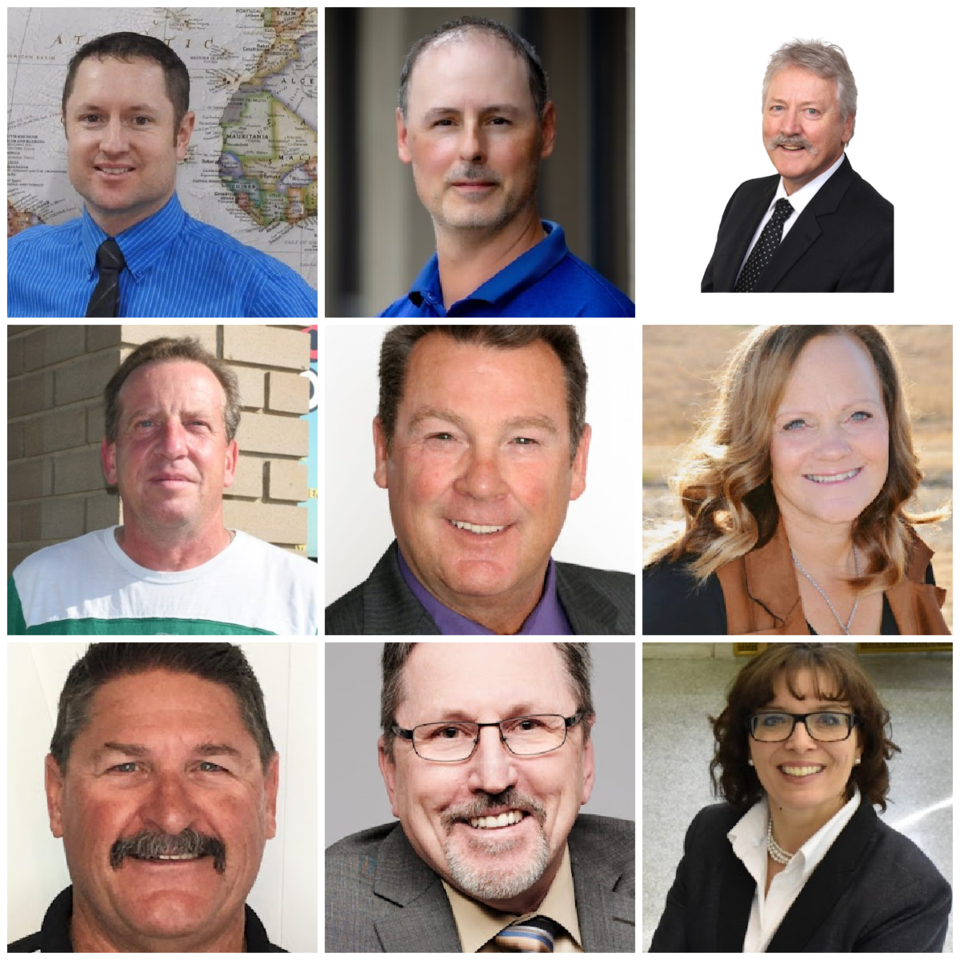The Moose Jaw and District Chamber of Commerce hosted a virtual discussion for the mayoral candidates on Oct. 21, with the chamber giving candidates three questions beforehand and asking several questions that were submitted online.
The candidates included Coun. Heather Eby, Coun. Kim Robinson, Coun. Crystal Froese, Brett McAuley, Clive Tolley, Sam Morrison, Wayne Watermanuk, Mike Simpkins and Michael Haygarth.
The mayoral byelection is Wednesday, Nov. 3.
Making changes
The chamber’s first question was what big change the candidates would make and how they would accomplish that goal.
Eby pointed out that the mayor doesn’t change things single-handedly without the whole of council voting on something. That said, she would like to encourage more in-depth discussion on topics, especially since this group is now in its second year.
Operationally, she wanted to see garbage collection pickup expanded earlier and later in the year, more ice rentals offered in the summer, and multi-year tendering for projects.
Froese said an economic plan is needed to help the community recover from the pandemic. She would look to grow businesses and ensure entrepreneurs have all the information they need to succeed. She would also better promote the City of Moose Jaw’s service app.
Haygarth believed that if all 35,000 residents were challenged to make one extra positive action and help a neighbour or co-worker, the community and public services would improve quickly.
If elected, McAuley said he would change the culture at city hall. He believes — based on conversations with residents — that it is not responsive to people’s needs and causes frustration through red tape and odd decisions, such as digging up new roads weeks after they’re paved.
He thought this culture change would empower city employees to fix the problem and efficiently handle issues.
Morrison said he would address the community’s growing crime problem, which is rooted in illegal drugs and overlaps with homelessness. Further, he would consult with emergency personnel, mental health experts and charities such as the Salvation Army and Riverside Mission and look for housing options for homeless women with children.
“We also need to keep Crescent Park safe for all to enjoy,” he added.
If elected, Robinson said he would address the disconnect between the community and city hall. He believes public engagement “is an absolute must,” which would mean promoting neighbourhood barbecues and encouraging residents to come to speak with councillors about issues.
“We have settled for just good enough. That doesn’t cut it for me,” he stated.
Council needs to be more accountable to taxpayers, said Simpkins, since he believes it is not listening to residents or even people who attend meetings. Furthermore, he wants to see the city divided into wards and each councillor given an area to represent, so he or she can bring the needs of that area to the council table.
More wealth needs to be created so everyone can flourish, said Tolley. He wanted to see River Street developed to complement the events at Mosaic Place and generate economic spinoff.
“We’ve been sitting for 10 years looking at a dirt parking lot. As Joni Mitchell would say, ‘They paved paradise and put up a parking lot,’” he added.
For Watermanuk, he also wanted to see River Street developed, while he wanted construction work to be better co-ordinated, so the city didn’t waste money working on the same project. He also wanted to address snow removal, the Fourth Avenue bridge, and potentially build a bridge over 17th Avenue.
Economic drivers
The chamber’s second question asked candidates what they thought the top three economic drivers of Moose Jaw were and how they would improve economic growth.
Some of the economic drivers that candidates suggested — and where some overlapped with each other — included mining, agriculture, rail transportation, small- and medium-sized businesses, downtown projects, community events, tourism, technology, the municipal airport, the agri-foods industrial park, the Great Plains Power Station, the Grayson business park, manufacturing and geothermal initiatives.
Working co-operatively
The chamber’s third question asked candidates how they would work co-operatively with council and influence its decisions.
Haygarth said he would bring energy to council so everyone felt their voice was heard, while he would also walk the streets and ask residents what they need and bring back those ideas.
If elected, McAuley said he would treat the city as a for-profit business since, as a corporation, it was responsible to its shareholders — the taxpayers. He would also use councillors’ experiences as small business owners to effect change.
Morrison would avoid micro-managing city staff and encourage productivity while listening to council and inspiring more problem-solving.
A leader needs to be genuine, co-operative, a continuous learner and open to new ideas — qualities that Robinson says he possesses. Furthermore, he would commit to developing a vision for the community while encouraging council to engage with the public regularly.
Simpkins would also ensure that councillors regularly work with residents, while he would meet with all municipal staff to find out what they need.
Like joining a hockey team, Tolley said he would listen to council and see if they could produce results by working together. He would also work with city administration to cut red tape at city hall so development could occur.
Tolley also wanted to increase industry, commerce and jobs so that more people could work, own homes and pay property taxes.
Watermanuk would create a ward system, so each councillor knew the issues in each area.
Eby would contact all council members to see what they wanted to accomplish, especially through the budget and policy directions. She would also rely on their strengths to fill in any knowledge gaps.
If elected, Froese would rely upon city administration to provide information on issues and work with council to continue modernizing city services.
The mayoral byelection is Wednesday, Nov. 3.




